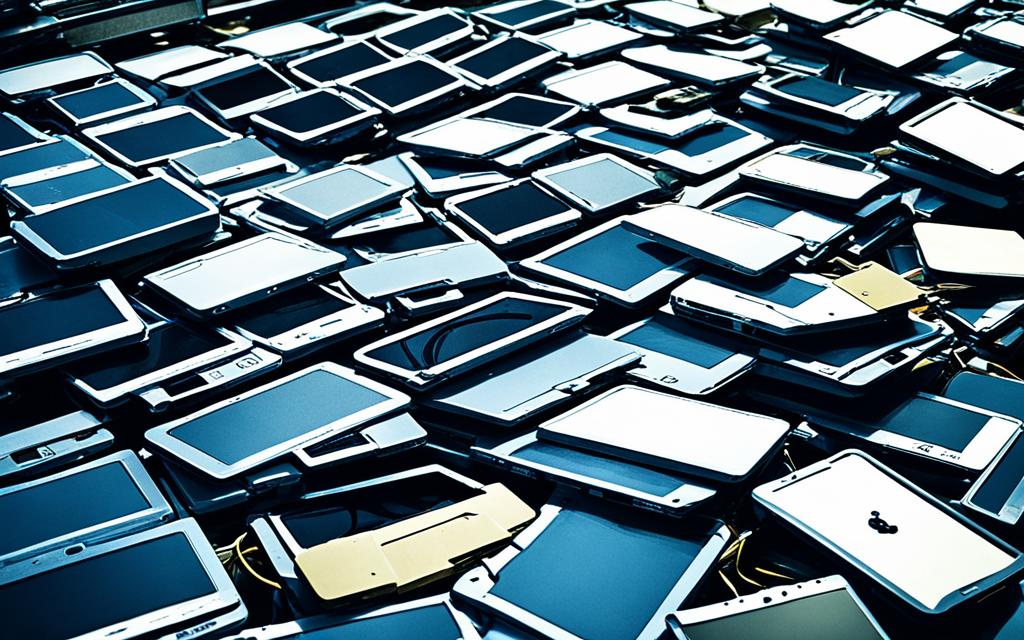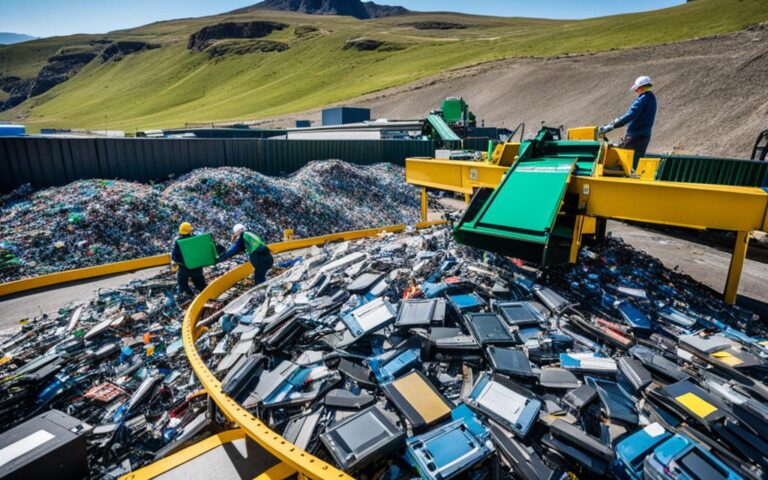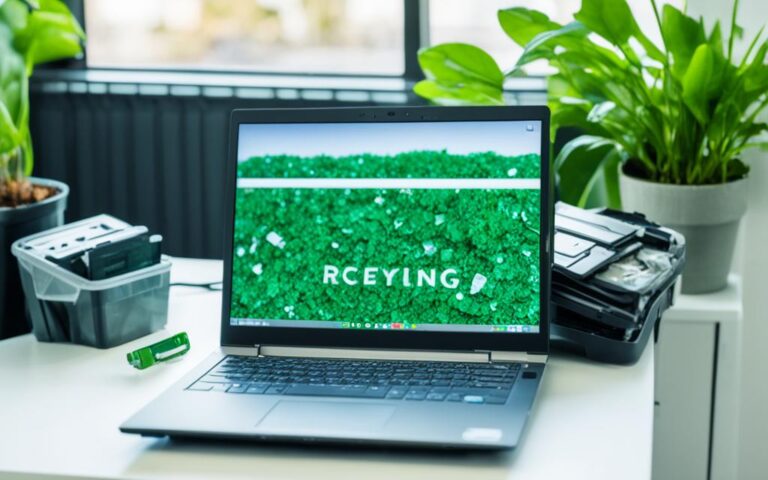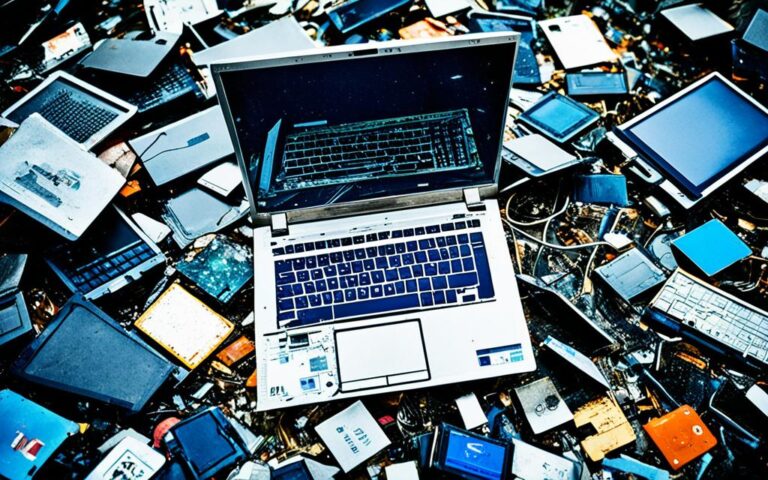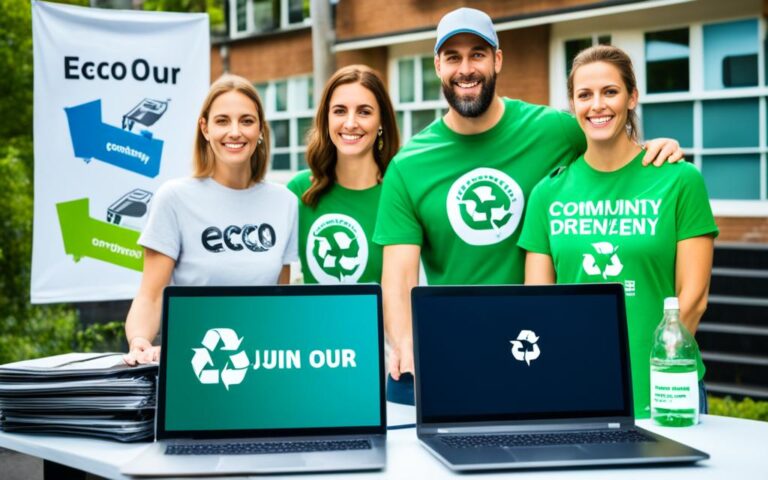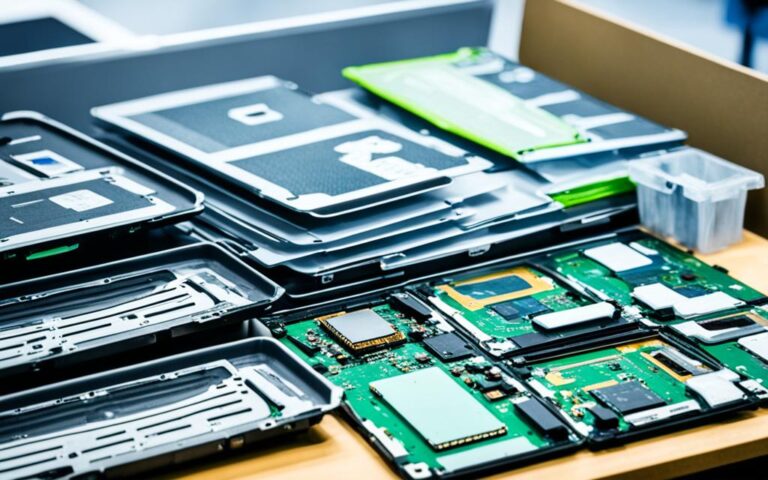The Importance of Certified Laptop Recycling Centers
Certified laptop recycling centers play a crucial role in ensuring responsible disposal, data security, and environmental protection. Not all e-waste recycling companies are created equally, which is why it is important to choose a certified company. By opting for certified laptop recycling, businesses can trust that their end-of-life technology will be safely and effectively recycled, reducing the impact on the environment and safeguarding against data breaches.
At certified recycling centers, expert facilities are equipped with the necessary resources and technology to handle electronic waste responsibly. They follow stringent guidelines established by the R2 certification, created by Sustainable Electronics Recycling International (SERI). This certification ensures that the recycling process protects the environment, human health, and safety, adhering to operational and environmental performance standards.
By choosing a certified laptop recycling center, businesses prioritize not only the responsible disposal of their outdated technology, but also the security of their sensitive data. With data breaches becoming increasingly prevalent, it is essential to trust certified recyclers who have the expertise to securely destroy data and erase all traces of information from the recycled devices.
Make the responsible choice. Choose certified laptop recycling centers for the proper disposal of your electronic waste and the protection of your data.
What is R2 Certification and Why is it Important?
R2 certification, established by Sustainable Electronics Recycling International (SERI), is a global certification process that aims to minimize the environmental and health risks associated with used and end-of-life electronics. This certification ensures that electronics recyclers adhere to strict guidelines that cover multiple aspects of the electronics supply chain, including environmental performance, health and safety, quality, and data protection standards.
R2 certified companies are committed to responsible electronics recycling and data protection. By choosing an R2 certified company, businesses can have peace of mind knowing that their end-of-life technology will be managed in an environmentally-friendly manner, ensuring the proper disposal of hazardous materials and reducing the impact on the planet.
Moreover, data protection is a crucial aspect of R2 certification. R2 certified companies follow rigorous protocols to securely destroy data from electronic devices, safeguarding sensitive information and protecting businesses from potential data breaches and identity theft.
The importance of R2 certification cannot be overstated. It provides businesses with the assurance that their electronics will be recycled responsibly, protecting the environment and preserving valuable resources. Furthermore, it ensures that data security is prioritized, mitigating the risks associated with improper disposal of electronic devices.
By choosing an R2 certified company for electronics recycling, businesses can demonstrate their commitment to sustainable practices and responsible data management, contributing to a cleaner, greener future.
“R2 certification ensures responsible electronics recycling and data protection, offering businesses peace of mind and environmental sustainability.”
The Environmental Benefits of Certified Laptop Recycling
Certified laptop recycling offers a range of environmental benefits that make it a crucial practice in our efforts to protect the planet and mitigate the harmful effects of e-waste. By responsibly recycling laptops and other electronic devices, we can significantly reduce the negative impact on our environment, human health, and natural resources. Let’s explore some of the key environmental benefits of certified laptop recycling:
1. Reduction of Toxic Materials
Electronic devices, including laptops, contain hazardous materials such as lead, mercury, and cadmium. These toxic substances, if not properly managed, can seep into the soil and water, polluting ecosystems and posing a threat to plants, animals, and human health. Certified laptop recycling ensures the safe extraction and disposal of these harmful materials, preventing their release into the environment.
2. Prevention of Air Pollution
E-waste often contains toxic chemicals that, when incinerated or improperly disposed of, release harmful pollutants into the air. These pollutants contribute to air pollution and can have severe health implications for both humans and wildlife. By recycling laptops through certified processes, we prevent the emission of dangerous substances into the atmosphere, helping cleanse the air we breathe.
3. Minimization of Landfill Waste
As technology advances, the volume of e-waste generated continues to escalate. When electronic devices like laptops end up in landfills, they take up valuable space and contribute to environmental degradation. Certified laptop recycling diverts e-waste from landfills, significantly reducing the strain on landfill capacity and preventing potential contamination of surrounding soil and groundwater systems.
4. Conservation of Natural Resources
Laptops and other electronic devices are made up of valuable components and materials that require significant energy and resources to extract and manufacture. By recycling laptops, we reduce the need for mining and processing raw materials, conserving precious natural resources such as metals, minerals, and fossil fuels. This conservation effort contributes to the overall sustainability and longevity of our planet.
The Social and Economic Impact of Certified Laptop Recycling
Certified laptop recycling not only has environmental benefits but also has a positive social and economic impact. By reusing old computers and donating them to schools and low-income families, certified recyclers support the local community and provide access to technology for those in need.
Recycling e-waste also creates jobs in local recycling plants, contributing to the economy and promoting sustainable practices. The social and economic benefits of certified laptop recycling help create a better future for both people and the environment.
- Supporting the local community by donating reusable laptops to schools and low-income families.
- Promoting access to technology and bridging the digital divide.
- Creating job opportunities in local recycling plants.
- Contributing to the economy through sustainable practices.
By engaging in certified laptop recycling, businesses and individuals can make a real difference in their communities and contribute to a more sustainable and inclusive society.
The Social Impact
One of the key social impacts of certified laptop recycling is the opportunity it provides for individuals and communities to access technology. By donating reusable laptops to schools and low-income families, certified recyclers help bridge the digital divide and ensure that everyone has the chance to participate fully in the digital age.
Access to technology is essential for education, employment, communication, and day-to-day activities. By providing access to laptops, certified recyclers empower individuals and enable them to enhance their skills, pursue educational opportunities, and connect with others.
The Economic Impact
Certified laptop recycling also has a positive economic impact, particularly in terms of job creation and sustainable practices. Recycling e-waste requires specialized skills and expertise, leading to the creation of new jobs in local recycling plants. These jobs contribute to the growth of the local economy and provide employment opportunities for individuals in the community.
Additionally, certified laptop recycling promotes sustainable practices by diverting electronic waste from landfills and reducing the need for mining new materials. This helps conserve natural resources, reduce environmental impact, and promote a circular economy.
By supporting certified laptop recycling, businesses and individuals can make a positive impact on both the environment and society. Through job creation, community support, and the provision of access to technology, certified recyclers play a vital role in building a better future for our communities and the planet.
The Role of IT Recycling Scheme in the UK
In 2011, the UK government established the IT Recycling Scheme, a vital initiative aimed at preventing electronic waste from being deposited in landfills. Under this scheme, businesses that manufacture or import more than 5,000 TVs, printers, or computers yearly are required to affiliate with authorized recyclers. These recyclers are responsible for organizing the collection and recycling of electronic waste, contributing to the recycling of thousands of tonnes of electronic devices each year.
The IT Recycling Scheme plays a crucial role in environmental protection and the responsible disposal of IT waste in the UK. By ensuring that businesses comply with recycling regulations, the scheme helps reduce the negative impact of electronic waste on the environment, promoting a sustainable approach to waste management.
Key Features of the IT Recycling Scheme
| Features | Benefits |
|---|---|
| Preventing landfill accumulation | Reduces environmental pollution and contamination |
| Promoting responsible disposal | Minimizes the release of hazardous substances into the environment |
| Encouraging sustainable practices | Supports the conservation of natural resources |
| Fostering recycling and circular economy | Reduces the demand for new raw materials by reusing electronic components |
“The IT Recycling Scheme is a valuable framework for ensuring the proper management of electronic waste in the UK. By holding businesses accountable for their role in the recycling process, the scheme protects the environment, promotes responsible disposal, and contributes to the sustainable management of IT waste.”
– [Expert Name], Environmental Specialist
Conclusion
When it comes to responsible disposal, data security, and environmental protection, certified laptop recycling centers play a crucial role. By choosing an R2 certified company, businesses can ensure that their e-waste is managed according to strict guidelines, and their data is securely destroyed. But the benefits go beyond that.
Certified laptop recycling has significant environmental advantages. It helps reduce the amount of toxic materials in circulation, protecting plants, animals, and human health. By preventing the emission of dangerous pollutants, it cleanses the air, soil, and water. Additionally, by recycling electronics, we can reduce air pollution, decrease the need for mining new materials, and minimize the amount of e-waste ending up in landfills. These actions contribute to a healthier planet for future generations.
It’s important to note that certified laptop recycling also has social and economic impacts. By reusing old computers and donating them to schools and low-income families, certified recyclers support local communities and provide access to technology for those in need. Moreover, the recycling process creates jobs in local recycling plants, contributing to the economy and promoting sustainable practices.
In the UK, businesses can further contribute to responsible electronics recycling by participating in the IT Recycling Scheme. This scheme ensures that electronic waste is properly collected and recycled, preventing it from ending up in landfills. By adhering to this initiative, businesses can actively protect the environment and contribute to the responsible disposal of IT waste.
FAQ
What is the importance of certified laptop recycling centers?
Certified laptop recycling centers play a crucial role in ensuring responsible disposal and data security. They provide expert facilities that follow strict guidelines to protect the environment, human health, and safety.
What is R2 certification and why is it important for electronics recyclers?
R2 certification is a global certification process established by Sustainable Electronics Recycling International (SERI) to minimize environmental and health risks posed by used and end-of-life electronics. It sets strict guidelines for electronics recyclers, covering areas such as operational and environmental performance, data security, and quality standards. R2 certified companies ensure responsible recycling and data protection.
What are the environmental benefits of certified laptop recycling?
Certified laptop recycling helps reduce the amount of toxic materials that can harm the environment and human health. It also cleanses the air, soil, and water by preventing the emission of dangerous pollutants. Additionally, it prevents e-waste from ending up in landfills and reduces the need for mining new materials, contributing to a better quality of life for future generations.
What is the social and economic impact of certified laptop recycling?
Certified laptop recycling has a positive social impact as it supports the local community by reusing old computers and donating them to schools and low-income families. It also creates jobs in local recycling plants, contributing to the economy and promoting sustainable practices.
What is the role of the IT Recycling Scheme in the UK?
The IT Recycling Scheme, introduced by the UK government in 2011, aims to prevent electronic waste from ending up in landfills. It requires businesses manufacturing or importing a certain number of TVs, printers, or computers per year to affiliate with authorized recyclers. These recyclers organize the collection and recycling of e-waste, promoting responsible disposal and environmental protection.

